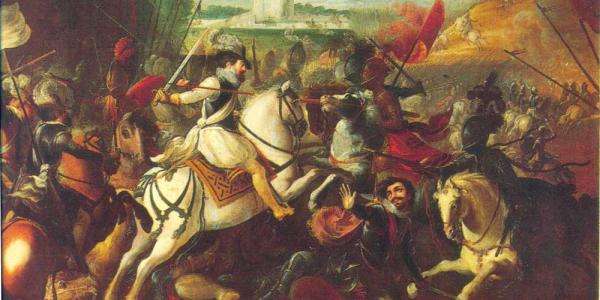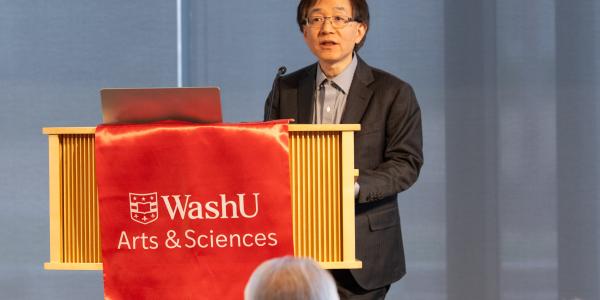Rival families fight for the throne by racking up the body count through political maneuvers, murders, battles, and betrayals. This summation is true as much for the hit HBO series Game of Thrones as it is for history, specifically the Atlantic world of early modern era. Historian Alex Dubé examines how our understandings of power and violence have fundamentally changed over time, and what modern day shows like Game of Thrones tell us about the present. Does absolute power corrupt absolutely? Tune in.
To read about the historical parallels Dubé has found and predictions he has made, check out this feature article.
Transcript:
RK (host): "When you play the game of thrones, you win or you die.” This iconic line neatly sums up HBO’s hit series Game of Thrones, which kicked off it’s 7th season this summer, pushing it ahead of George R. R. Martin’s book series, from which the show draws. Audiences around the world are anxious to watch the fates of their favorite characters—at least the ones who have survived so far—as the series moves into uncharted territory. However, fans have found at least one source that might hold clues for what’s to come: the past.
I’m your host Rebecca King, and this is Hold That Thought.
Today our guest is Alex Dubé, an assistant professor of history at Washington University in St. Louis who teaches a course called “How to Sit on an Iron Throne: Reading (Early Modern) Politics and Violence Through Game of Thrones.” His particular area of research focuses on the politics of the Atlantic world in the early modern period, and through this, he has also had to study themes like violence and power.
Alex Dubé: When I finished my Ph.D., I needed some light reading to distract me, so I decided I would read Game of Thrones. It didn't really distract me from any of the themes I usually work on, but it was quick reading nonetheless, and it was quite interesting. I think the first couple of volumes are well-written and certainly well-researched.
RK: In a companion written feature on our website, you can read all about some of the parallels Dubé has found between Martin’s series and the historical record, why he believes the series is set in the early modern period instead of the middle ages, and he shares some predictions. But today, we’re going to be talking about power and violence and how these have—or have not—changed over time.
AD: In the early modern period, power is inherently personal. You gain power not really from what is being deferred to you, but really by you from who you are. By virtue of your birth. Sometimes I use a simplification with students. It’s like, in the early modern period, you're not powerful because you're rich, which is often how we equate this today. You're rich because you're powerful. It's the visual representation of power you already have, and that wealth for instance may not actually stem from gold coins in your possession. It might stem from the fact that you have a lot of people willing to do your bidding and a lot of land and a lot of resources from which you can draw. So that actually sometimes shifts our understanding of what of what power is.
But then again, the early modern period is a moment where you can change your status. Even though it's a moment that does emphasize quite a bit the value of order, it's also a moment that values the formative capacity of ambition, opportunity, and also technical skills. This is a time where suddenly law becomes a way for you to rise. The church becomes a way for you to rise. Money-handling, because this is a moment where states become much more capable of raising taxes, and therefore, there's a lot of interplay of lending and borrowing for instance. These are technical skills that allow certain individuals to rise, and that disturbs the self-representation that people may have of how power is accrued basically.
RK: So the early modern period is a time of change. It starts with clear ideas of what power is—something you are born with—and begins to give way to a changing society where individuals can climb the social ladder and become powerful, by virtue of their own actions. And that’s why Dubé thinks Game of Thrones is a poor representation of history. The show and books, he says, represent a very disillusioned, very 21st-century understanding of power, where most characters are striving for power with Machiavellian means. And that troubles him.
AD: I find that the thing that we grapple with is, like, it's easy to read Game of Thrones as a very cynical unfolding of history. And I find that all history is to a certain extent present, and we read it from what has peopled our historical imagination. Most of my students are not history majors, so they’ll do all sorts of other things in life. But if Game of Thrones is the marker of their historical imagination, then the moment they encounter history, they will think, “oh people are acting this way because…” and they will take Game of Thrones to do this analysis. So in a way, they will project a form of very 21st-century cynicism onto power relations of the past and of the present. And I'm trying to restore a moment where there are other possibilities. Where people are acting in good faith. Now that faith may be quite different from what we imagine today, but if we're willing to extend the idea that people today are acting also for things like the love of the Constitution, or a desire for the greater good, or these kinds of reasons, then we should do the same courtesy of that same possibility for people in the past.
And if we're not willing to extend that, if we really think that it’s always about cynicism and power struggles and power plays, then there is something profound to ask about power itself. If it's unchanging and ahistorical, then it might not be a good category to read because if it's always that, if we want to ascribe it to human nature, I believe it's much more problematic then and has profound repercussions for how we understand power and politics today. In my own work, I struggle quite a bit with that question. I'm not sure I’ve found a good answer, but I think we need to ask the question that way. Like if we're not willing, if it's always about being cynical, then it's highly problematic. And if cynicism is itself like a historical artifact, like if people become cynical, if it's a legitimate political stance, then we can study it as a historian. Like, when does that happen? What are the markers? How do people judge others for being cynical or for falling short of expectations? And if it's a whole “theater of virtue,” then you have to ask, who are we kidding? If it's just make believe, if people are always motivated by baser values, then why are they putting on a show in the first place? Who is liable to believe that? And honestly, I think people in the 15th and 16th centuries do wonder about that. I think the answers they give are different and that is what I find interesting.
RK: This cynical view of power and history brings to mind the popular saying, “Absolute power corrupts absolutely.”
AD: If it's a starting point, then it's problematic because that’s a saying that’s given in the early 19th century. So clearly that person—I forget his name…
RK: John Emerich Edward Dalberg-Acton, a British politician known as Lord Acton, said this in 1887.
AD: But anyway, he’s making that judgment at a moment where it's in good standing to say that absolute power is terrible. Well, as a historian, I want to ask, “what was the definition of corruption? What were the moments where people would say that's unacceptable?” And I have to confront that with people in the 16th century who are saying, “if power is not absolute, here's what we have: chaos.” People dying left and right. And that's actually the setup of Game of Thrones.
RK: People in the early modern period would have experienced periods of intense civil war, including the War of the Roses in Britain and France’s Wars of Religion, where rival families fought to claim the throne for themselves by stacking up the body count. And so it is fair to say that in this time, perhaps civilians would have preferred stability, even if it was an authoritarian government.
AD: There's a character Varys, the keeper of secrets, he stands in for the state—that's how I use it in the class, but I do think it's a good it's a good approximation. He's says, “I stand with Daenerys because she's the legitimate claimant, and she's the one who's going to quash dissent and will have a strong monarchy that will ensure peace and prosperity.” So the idea that you could value absolute power makes it interesting to investigate.
Now my concern as a citizen is that, for the longest time in the United States but also in Europe and Canada, democracy was this truism—you didn't really need to defend it, or you defended it with easy slogans against threat of communism and totalitarianism. But there are groups who are documenting the decline of democratic sensibility in our societies. And I find that when I first began to—and it’s a short period of time—when I first began to teach about absolute power, absolutism, etcetera, students were kind of taken aback. I asked them to defend absolutism, and they found it difficult to defend because they were brought up on the rhetoric that the American Revolution has given us, or the French Revolution has given us... But in recent years, I found that students are more willing to [defend absolutism]. I think it’s because the cynicism is like, “Yes, sure. Whatever works.” I'm not saying that students are proponents of absolutism. It's just that they contemplate it with less horror than they used to. So it's become again a possibility, which I'm not sure I feel about that.
RK: Okay, so let’s play the devil’s advocate. What would we really lose under an authoritarian government? What do we have now, with our current understanding of power, that we would not have had in the early modern period?
AD: If power stems from who you are, and if it's unequally distributed, then what that robs you of is the dignity of your own mind. That is to say, why should I listen to you if you're already not powerful? Today sometimes we don't pretend too much. We listen much more to people who we think have power, but there are all sorts of ways to remind us that everyone has to have equal access to that dignity. That one's opinion is worthy of consideration, not necessarily approval and not necessarily agreement, but consideration by virtue of being a fellow citizen. That consideration is just out the window; I mean, it’s a preposterous idea for people in the 16th and 17th century. Like, why would you?
I see that all the time in my own research, like, “Oh yeah, that's a petition, but clearly that petition has been signed by the rabble, so it's worthless.” If the petition is signed by the right kind of people, then you have to listen to it because they’re important.
RK: This is opposed to the sort of petitions online, like those at on the White House website, where, if enough people sign, it prompts an action or a change.
AD: We've had strength in numbers in this case. That might be just a side effect of wanting to quantify everything, but that’s the thing because now no one looks at the name and is like, “oh I know this person, and she is of sound mind and judgment.” Today no one would conceivably know everyone on a petition. But back in the 18th century you would look at the name, which is why it was a lot more dangerous because you would identify yourself. In a way, it was a show of strength: “I am confident enough in my own position that I'm willing to put my name on it.”
RK: This brings us finally, to violence. Game of Thrones is a show known for its brutality, whether the death of Ned Stark or the horrifying Red Wedding. So how can we think about violence today? Was the early modern period really more violent than it is today with the threat of ISIS or terrorists looming?
AD: I think it's almost impossible to talk about this show or about politics and violence in the early modern period without confronting whether or not our world, our time is more or less brutal than times past. And to be fair, it's been a question that has motivated a lot of scholars to investigate the violence of the past and violence of today. It's an inquiry that always stumbles upon the difficulty of qualifying violence. How do you qualify violences conducted on a massive scale—in postindustrial warfare—and violence that is conducted almost daily but in ways that leave no mark? How do you confront violence in a world that professes to have very low tolerance for it—like our world—faced with a world that professes to have a high tolerance of it? So it's really… It’s really, really hard.
RK: Context is very important with violence as well, historian Alex Dubé says.
AD: Defense mechanisms in the 16th and 17th century will say, “It's nothing. He punched me, sure.” “Why?” “Who cares?” Where compared to today, someone punching you means very different things, and it may even mean a lot of different things depending on where you are in the United States and your place, your community. For example, I come from a very working class background, and if you could not answer someone punching you or threatening you with a punch, then you'd be severely judged. That being said, if you pulled out a knife against someone who punched you, you would be severely judged too because it would mean that you didn't know proportionality of violence. And that's what makes it so difficult to compare.
What most people who study violence show is that you have decreasing levels of violence over the early modern period, increasing recourse to tribunals to make yourself heard and vindicated as opposed to personal violence. The idea that violence would serve you better than the tribunal is something that loses ground in the 18th century. Today I would venture that in a world where we much prefer our violence to be exerted institutionally and systematically, away from our eyes. So therefore, I think there's a voyeuristic aspect of the show, and this is one of the cases where if you wanted to make the show more historically accurate, I would venture you would have to make violence more banal. And that wouldn't work because the show relies on it to be shocking. And if we're reaching a point where violence is no longer shocking in the show, then again I think it asks very troubling questions. If the shock value is gone, does that mean we would tolerate it in our own interactions. There's also the HBO factor, like with the nudity. The idea that you're still transgressing something, even though I’m not sure, in the age of YouTube, what you could be transgressing. I find that weirdly reassuring because if we no longer have that, what else have we got?
RK: Many thanks to Alex Dubé, an assistant professor of history at Washington University in St. Louis. And thanks to you too for listening to Hold That Thought. You can find many more podcasts on all sorts of topics on our website holdthatthought.wustl.edu.





